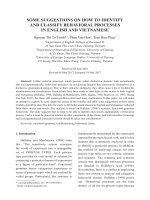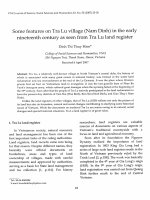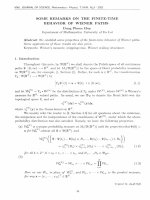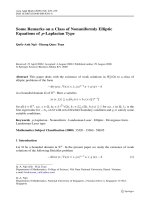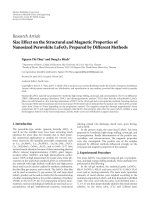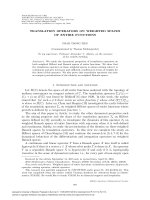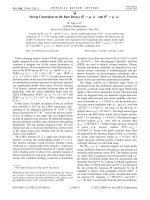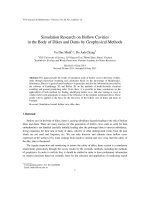DSpace at VNU: Phytochemical Studies on Mallotus barbatus
Bạn đang xem bản rút gọn của tài liệu. Xem và tải ngay bản đầy đủ của tài liệu tại đây (54.84 KB, 2 trang )
Chemistry of Natural Compounds, Vol. 49, No. 1, March, 2013 [Russian original No. 1, January–February, 2013]
PHYTOCHEMICAL STUDIES ON Mallotus barbatus
Phan Minh Giang,1* Vu Minh Trang,1,2
and Phan Tong Son1
UDC 547.918 + 972
Mallotus barbatus (Wall.) Muell. Arg. (Vietnamese name: Bum bup gai) belongs to the genus Mallotus of the family
Euphorbiaceae. Most of the 150 Mallotus species are recorded for East and Southeast Asia, and Vietnam is the habitat of about
40 Mallotus species [1]. M. barbatus is a shrub or medium-sized tree up to 6 m. The use of the bark of M. barbatus in
Vietnamese traditional medicine to treat stomach ache and duodenal ulcer is of special interest [2, 3]. The potential antioxidant
activity of the leaves of M. barbatus was also determined in a 1,1-diphenyl-2-picrylhydrazyl (DPPH) radical scavenging
activity test [4]. In terms of the antioxidant effect, plant phenolic constituents can play a significant role; therefore, in the
present study a systematic chromatographic fractionation procedure was developed to investigate the chemical constituents of
the leaves of M. barbatus collected in northern Vietnam with emphasis on its phenolic compounds. The study led to the
isolation of four phenolic compounds, methyl gallate (1) [5], gallic acid (2) [5], protocatechuic acid (3) [6], and (E)-cinnamic
acid (4) [7], a chromene, 8-cinnamoyl-5,7-dihydroxy-2,2,6-trimethylchromene (5) [8], two flavonoids, kaempferol (6) [9] and
quercetin (7) [10], three flavonoid O-glycosides, kaempferol 3-O-E-D-glucopyranoside (8) [11], quercetin 3-O-E-Dglucopyranoside (9) [11], and kaempferol 3,7-di-O-E-D-glucopyranoside (10) [11], taraxerol (11) [12], taraxerone (12) [13],
E-sitosterol (13) [14], E-sitosterol 3-O-E-D-glucopyranoside (14) [14], palmitic acid (15), and pentadecanoic acid (16). The
structures of compounds 1–16 were determined by comparing their ESI-MS (LC-MS Agilent 6310 system) and 1H (500 MHz)
and 13C NMR (125 MHz) (Bruker Avance 500 NMR spectrometer) spectroscopic data with literature values [5–14]. The
occurrence of compound 5 is of interest since so far prenylated chalcones and dimethylchromenes, which can be formed from
the cyclization of their aromatic prenyl groups, have been found only in M. philippinensis [8, 15]. To the best of our knowledge,
this study is the first comprehensive report on the chemical constituents of M. barbatus.
The fresh leaves of M. barbatus were collected in Lao Cai Province, Vietnam in June 2008, and the plant was
identified by Nguyen Quoc Binh, a botanist of the Institute of Biological Resources and Ecology, Vietnam Academy of Science
and Technology, Hanoi, Vietnam. A voucher specimen (VN 517) is deposited in the same Institute. The leaves were air-dried
and then oven-dried at 50qC. A 6-kg amount of the dried leaves was powdered and then extracted with MeOH at room
temperature. The aqueous MeOH extract was partitioned successively with n-hexane, CH2Cl2, EtOAc, and n-BuOH. Removal
of the extraction solvents gave n-hexane (146.7 g), CH2Cl2 (81 g), EtOAc (48.3 g), and n-BuOH (262.4 g) soluble fractions.
R2
OH
OH
R1O
HO
O
O
O
5
H
OR3
OH
O
8 - 10
R1
R2
H
H
11, 12
8: R1 = R2 = H, R3 = E-D-Glc; 9: R1 = H, R2 = OH, R3 = E-D-Glc
10: R1 = R3 = E-D-Glc, R2 = H; 11: R1 = H, R 2 = OH; 12: R1,R2 = O
1) Faculty of Chemistry, Hanoi University of Science, Vietnam National University, Hanoi, 19 Le Thanh Tong
Street, Hanoi, Vietnam, e-mail: ; 2) University of Education, Vietnam National University,
Hanoi, 144 Xuan Thuy Road, Hanoi, Vietnam. Published in Khimiya Prirodnykh Soedinenii, No. 1, January–February,
2013, pp. 112–113. Original article submitted December 6, 2011.
0009-3130/13/4901-0129 2013 Springer Science+Business Media New York
129
A 43.4-g amount of the n-hexane-soluble fraction was chromatographed on silica gel using n-hexane–acetone as the mobile
phase, and further purification of the column fractions by recrystallization or silica gel column chromatography afforded 12
(64.6 mg), 13 (0.7 g), and 15 (48.5 mg). A 44.8-g amount of the CH2Cl2-soluble fraction was separated by repeated
chromatography on silica gel using a gradient solvent system of n-hexane–acetone and on RP-18 silica gel using an MeOH–H2O
solvent system. Further chromatographic purification of the column fractions obtained on silica gel gave 4 (2 mg), 5 (37.9 mg), 11
(30 mg), and 16 (2.7 mg). A 24.4-g amount of the EtOAc-soluble fraction was subjected to silica gel column chromatography
with an n-hexane–EtOAc–HCOOH gradient solvent system, Sephadex LH-20 column chromatography with MeOH, and
silica gel chromatographic purification with an n-hexane–EtOAc and CH2Cl2–EtOAc gradient solvent systems to afford 1
(52.1 mg), 2 (83.3 mg), 3 (250.7 mg), 6 (10 mg), 7 (10.7 mg), and 14 (6 mg). A 42.4-g amount of the n-butanol-soluble
fraction was separated on resin Diaion HP-20 with MeOH–H2O, and repeated chromatographic purification on silica gel
using gradient solvent systems of n-hexane–EtOAc–HCOOH and CH2Cl2–MeOH gave 6 (5 mg), 7 (9.7 mg), 8 (58.2 mg),
9 (30 mg), and 10 (10 mg).
ACKNOWLEDGMENT
This work was supported by the National Foundation for Science and Technology Development (NAFOSTED, Hanoi,
Vietnam).
REFERENCES
1.
2.
3.
4.
5.
6.
7.
8.
9.
10.
11.
12.
13.
14.
15.
130
N. N. Thin, Taxonomy of Euphorbiaceae in Vietnam, Vietnam National University, Hanoics Publisher, Hanoi,
2007, p. 179.
V. C. Vo, Dictionary of Vietnamese Medicinal Plants, Medicine, Ho Chi Minh City, 1997, p. 135.
T. L. Do, Medicinal Plants and Herbal Drugs of Vietnam, Medicine, Hanoi, 2001, p. 94.
C. Tistaert, B. Dejaegher, N. N. Hoai, G. Chataigne, C. Riviere, V. N. T. Hong, M. C. Van, J. Quetin-Leclercq,
and Y. Vander Heyden, Anal. Chim. Acta, 649, 24 (2009).
K. J. Wang, C. R. Yang, and Y. J. Zhang, Food Chem., 101, 365 (2007).
Y. Yu, H. Gao, Z. Tang, X. Song, and L. Wu, Asian J. Trad. Med., 1, 101 (2006).
S. Paik, G. H. Kim, and J. S. Park, J. Ind. Eng. Chem., 11, 475 (2005).
Q. Hong, D. E. Minter, S. G. Franzblau, M. Arfan, H. Amin, and M. G. Reinecke, Nat. Prod. Commun., 5, 211 (2010).
J. B. Harborne and T. J. Mabry, The Flavonoids: Advances in Research, Chapman and Hall, London, 1982, 744 pp.
T. Yoshioka, T. Inokuchi, S. Fujioka, and Y. Kimura, Z. Naturforsch., 59C, 509 (2004).
P. K. Agrawal, Carbon-13 NMR of Flavonoids, Elservier, Amsterdam, 1989, 564 pp.
W. Y. Jin, X. F. Cai, M. Na, J. J. Lee, and K. Bae, Arch. Pharm. Res., 30, 412 (2007).
P. V. Kiem, C. V. Minh, H. T. Huong, N. H. Nam, J. J. Lee, and Y. H. Kim, Arch. Pharm. Res., 27, 1109 (2004).
M. T. Vu, T. H. Le, M. G. Phan, and T. S. Phan, Tap chi Hoa Hoc [Vietnam Journal of Chemistry], 48, 632 (2010).
C. Riviere, V. N. T. Hong, Q. T. Hong, G. Chataigne, N. N. Hoai, B. Dejaegher, C. Tistaert, T. N. T. Kim,
Y. Vander Heyden, M. C. Van, and J. Quetin-Leclerq, Phytochem. Rev., 9, 217 (2010).
